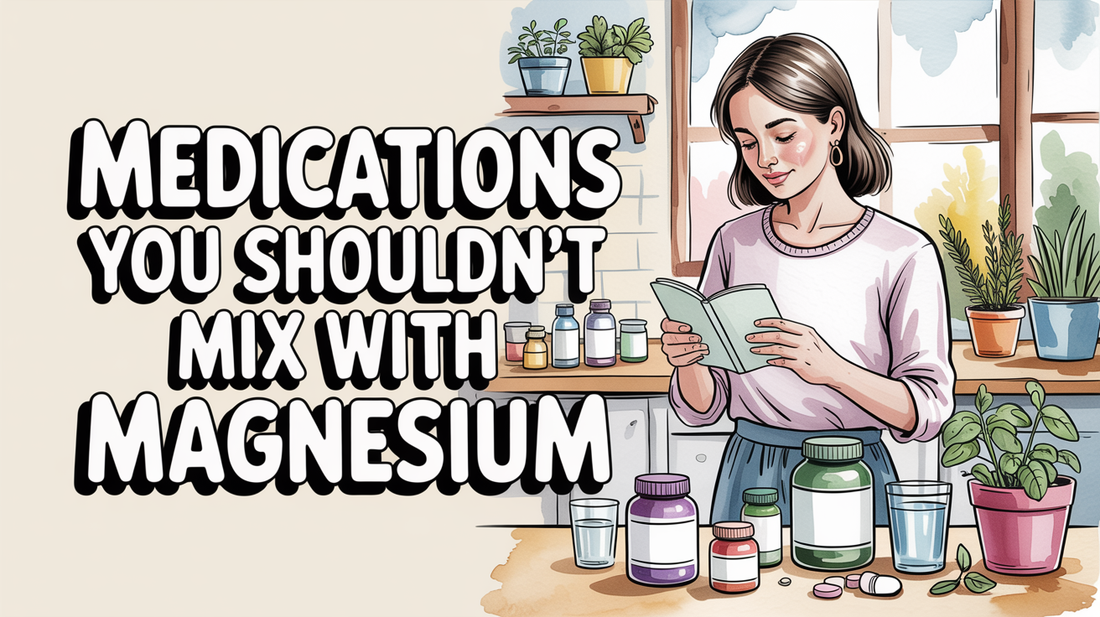What medications does magnesium interfere with?
Understanding how magnesium may interact with certain medications is essential for ensuring safe use. Magnesium interactions can significantly impact the effectiveness of some medications, raising questions about magnesium and medication safety. This blog post will break down the important information into three clear sections, allowing you to make informed choices tonight.
Magnesium may interfere with antibiotics (like tetracyclines), thyroid medications, and certain osteoporosis drugs
Magnesium can bind to various medications, affecting their absorption in the digestive system. This interference might decrease the effectiveness of important treatments, so understanding these interactions is crucial for maintaining health.
For instance, tetracycline antibiotics such as doxycycline and minocycline may not be absorbed properly if taken with magnesium. Similarly, fluoroquinolone antibiotics like ciprofloxacin can see their bioavailability reduced by as much as 90% when combined with magnesium. Thyroid medications, including levothyroxine, can also have their absorption significantly impacted by magnesium.
- Magnesium can prevent the absorption of tetracycline antibiotics.
- Fluoroquinolone antibiotics may lose up to 90% efficacy due to magnesium.
- Thyroid hormone absorption can decrease significantly with magnesium use.
- Osteoporosis drugs may become less effective when taken with magnesium.
- Iron supplements can face absorption challenges when magnesium is present.
Try It Tonight: Quick Start ✅
- Screen-free + dim lights for 10–15 minutes.
- Gentle stretch or slow breathing (4–7–8).
- Apply Magnesium Spray as directed (e.g., 4–8 sprays on legs/arms/shoulders 10–20 minutes before bed). Patch-test if new to topicals.
Magnesium can reduce absorption if taken at the same time as these medicines
The way magnesium interacts with other medications often involves chelation and competition for absorption. When magnesium is taken simultaneously with certain drugs, it can bind to them or compete for absorption sites, reducing how much of the medication the body can utilize.
For example, magnesium can create stable complexes with some drugs, making them unabsorbable. Additionally, magnesium may alter stomach pH, which can affect how well other medications dissolve and are absorbed. If magnesium speeds up intestinal transit, there may be less time for medications to be absorbed effectively.
- Magnesium can bind to medications, preventing absorption.
- It may compete for transport mechanisms in the intestines.
- Changes in stomach acidity can affect drug dissolution.
- Magnesium's laxative effects can reduce contact time for absorption.
- Bioavailability can decrease by 20-90% depending on timing.
Why We Recommend a Gentle Helper 🌿
Magnesium Spray is designed for quick absorption and a soothing, non-sticky feel with calming notes. It may support a consistent bedtime ritual.
- Quick-absorbing comfort—no heavy residue.
- Gentle feel designed to minimize tingling/itch.
- Clean-leaning and bedtime-friendly scent.
Always separate magnesium supplements from medications by 2–4 hours and consult a healthcare provider 🔍
Proper timing and medical supervision are essential when taking magnesium supplements alongside medications. It’s important to maintain a separation of 2–4 hours between magnesium and any medications that may interact to minimize potential interference.
Always inform your healthcare provider about all supplements you are taking, including magnesium. Some medications are best taken on an empty stomach, while others require food, which can influence when you should take magnesium. Monitoring and adjusting magnesium dosages can help ensure safety and effectiveness.
- Maintain a 2-4 hour gap between magnesium and medications.
- Always consult your doctor about potential interactions.
- Consider food requirements when timing medications.
- Higher magnesium doses may increase interaction risks.
- Regular monitoring may be needed for effective medication management.

